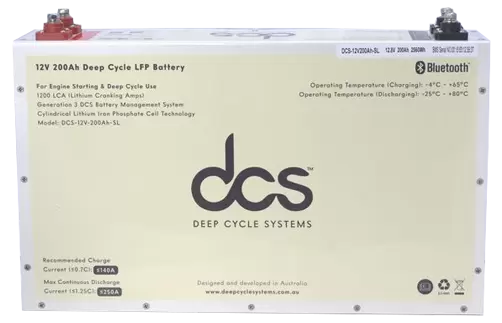
Efficient Li ion Solar Battery | Reliable Energy Storage
In today’s world, where sustainable energy solutions are becoming increasingly crucial, harnessing the power of the sun through solar panels has become a popular choice for many homeowners and businesses. However, one of the challenges of solar energy is its intermittent nature – the sun doesn’t always shine when we need it the most. This is where Li ion solar battery comes into play, offering a way to store excess energy generated during sunny days for use during cloudy or nighttime hours. In this blog post, we will explore the efficiency and benefits of Li-ion solar batteries for maximising renewable energy usage.
Understanding the Basics of Li-ion Solar Batteries
Li-ion solar batteries, which underpin modern renewable energy systems, utilise lithium-ion technology to offer a robust solution for solar energy storage. These batteries stand out due to their impressive energy density, enabling them to hold a significant amount of power in a relatively compact form. Central to their appeal is the mechanism by which they operate; during periods of peak solar production, excess energy is absorbed and stored, ready to be discharged when solar output wanes or demand surges.
This cycle of charge and discharge is crucial in bridging the gap between solar energy generation and consumption patterns, ensuring a consistent and dependable energy supply. Unlike traditional battery technologies, Li-ion variants boast a superior charge retention capacity and can endure thousands of charge cycles before any notable degradation occurs. This resilience against frequent charging and discharging makes them particularly suited to the cyclic nature of solar energy usage.
Moreover, the technology behind these batteries has advanced significantly, resulting in improved safety features and reduced risks of overheating or malfunction. This advancement enhances the reliability of Li-ion solar batteries and bolsters their efficiency as a cornerstone of sustainable energy systems.
The Benefits of Li-ion Batteries for Solar Energy Storage
Li-ion batteries are at the forefront of facilitating a seamless transition to renewable energy sources, particularly solar power. These batteries distinguish themselves through their superior energy density, allowing for a more compact energy storage solution without compromising control. This characteristic is particularly beneficial for solar energy systems, where space can often be at a premium. Thanks to their high energy density, Li-ion batteries enable households and businesses to store substantial amounts of solar energy, thus ensuring a steady supply of electricity even during periods with no sun.
Another notable advantage of Li-ion batteries is their longevity. These batteries often surpass a decade of service and are designed to withstand the rigours of regular, intense charge and discharge cycles inherent in solar energy systems. This durability translates into fewer replacements and disruptions over the lifespan of the solar energy system, underscoring their reliability and cost-effectiveness in the long term.
Moreover, their lightweight nature and minimal maintenance requirements add to their appeal. The ease of handling and upkeep ensures that owners can focus more on reaping the benefits of their solar energy system and less on the operational aspects of battery management. With the ability to efficiently store and manage the power generated from solar panels, Li-ion batteries are pivotal in maximising the utility and environmental impact of solar energy systems, paving the way for a more sustainable and resilient energy future.
How to Maximise Your Solar Energy Usage with Deep Cycle Batteries Solar
Maximising solar energy usage with deep cycle batteries solar requires a strategic approach tailored to align with your energy consumption patterns and the capabilities of your solar array. To optimise the utility of deep cycle batteries in solar applications, it’s essential to first gauge your typical energy usage. This enables the calibration of your solar system to store adequate energy during peak sunlight hours for use during off-peak times.
Implementing energy-efficient appliances and lighting can significantly reduce your overall power demands, allowing your stored solar energy to go further. Regular monitoring of battery charge levels and health is also crucial; this not only ensures the longevity of the batteries but also prevents energy wastage through inefficiency. Additionally, a smart energy management system can dynamically adjust energy consumption and storage, further enhancing the efficiency of your solar setup.
By meticulously planning and managing your energy use, deep cycle batteries can significantly boost the effectiveness of solar systems, enabling a more sustainable and self-sufficient energy solution.
Comparing Li-ion Solar Batteries with Other Storage Options
In the realm of solar energy storage, Li-ion solar batteries stand out for their remarkable benefits, but how do they stack up against alternatives like lead-acid and flow batteries? Lead-acid batteries, often praised for their lower initial investment, fall short in energy density and lifespan. These traditional batteries require more frequent replacements and offer less efficient energy storage, making them a less attractive option for long-term sustainability and cost-efficiency.
On the other hand, flow batteries present an innovative approach with their ability to scale energy and power capacities separately. Despite this advantage, they are comparatively new to the market, potentially posing challenges regarding availability, initial costs, and implementation.
It’s important to note that while lead-acid batteries may initially seem cost-effective, their overall lifecycle costs, coupled with the need for more frequent maintenance and replacement, could lead to higher expenses over time. Furthermore, the evolving technology and scale of production of Li-ion batteries are driving their costs down, rendering them increasingly competitive.
Therefore, when evaluating storage options for solar energy systems, considering the balance between upfront costs, performance, longevity, and maintenance requirements is crucial. With their superior energy density and minimal maintenance needs, Li-ion solar batteries offer a compelling choice for those prioritising efficiency and reliability in their solar energy storage solution.
Installation and Maintenance of Li-ion Solar Batteries
Setting up Li-ion solar batteries is efficiently managed by qualified solar energy installers, ensuring seamless integration with your existing solar panel and electrical infrastructure for optimal functionality. Once in place, the emphasis shifts towards maintaining their performance to extend their operational lifespan significantly. Essential maintenance routines include regularly inspecting charge levels to prevent overcharging or deep discharging, both of which can impair longevity.
Positioning these batteries in a cool and dry environment is paramount, as excessive heat or moisture can negatively affect their efficiency and safety. Additionally, ensuring adequate ventilation helps in mitigating risks associated with overheating. Adherence to these maintenance practices plays a vital role in sustaining the health of your Li-ion solar batteries, facilitating a consistent and dependable source of power for your solar energy system. Engaging in these proactive measures will aid in harnessing the full potential of your investment, empowering your transition towards a more sustainable and resilient energy future.
The Role of Deep Cycle Battery Marine Battery in the Adventures
Deep cycle marine batteries, an essential component for marine voyagers, stand at the heart of ensuring a seamless experience on water-bound escapades. Unlike their counterparts in static solar energy systems, these batteries are uniquely engineered to discharge slowly over extended periods, providing a reliable power source for marine navigation systems, lighting, and other onboard electronics. The continuous, steady power output is vital for maintaining operations during long voyages, where access to conventional power sources is non-existent.
These batteries’ resilience and capacity to endure repetitive, deep discharges make them indispensable for activities far from the shore. Their robustness ensures that essential systems remain operational, a critical factor for safety and convenience in the open sea. For adventurers seeking to explore marine environments, whether for leisure or research, the ability to rely on a consistent power supply cannot be overstated.
Integrating deep cycle battery marine battery into a boat’s power system involves considering the unique challenges posed by the aquatic environment. Saline air, moisture, and temperature fluctuations demand batteries that deliver performance and withstand these conditions without degradation. For enthusiasts ready to embark on marine adventures, choosing the right deep-cycle marine battery is a crucial step in preparing for the unpredictable nature of the sea, ensuring that reliable and enduring energy sources power each journey.
Navigating the Cost of Li-ion Solar Batteries
Whilst the initial investment in Li-ion solar batteries may seem daunting, it is essential to consider the broader financial landscape. The efficiency and longevity these batteries provide translate into considerable savings over time. The high energy density and minimal maintenance needs mean that the return on investment can be significant despite the upfront cost, especially when factoring in the reduced need for replacements and the lower energy bills due to efficient energy storage and usage.
Furthermore, exploring the various incentives and rebates that may be available is important. Governments and energy providers often offer financial assistance for those transitioning to renewable energy solutions, acknowledging distributed energy storage systems’ environmental and grid benefits. These incentives can offset the initial outlay, making adopting Li-ion solar batteries financially savvy.
Prospective buyers should also deliberate on the evolving market dynamics. As demand for renewable energy solutions grows and production technologies advance, the costs associated with Li-ion batteries are anticipated to continue their downward trend. This, coupled with the rising costs of traditional energy sources, further amplifies the economic argument for investing in Li-ion solar battery technology sooner rather than later.
Conclusion
Li-ion solar batteries have become pivotal for sustainable and reliable energy solutions. Their exceptional energy density, combined with a notably extended operational lifespan, positions them as a superior choice for those seeking to optimise their solar energy systems. These batteries not only facilitate a significant reduction in carbon footprint by leveraging renewable resources but also ensure that energy is readily available, irrespective of solar conditions. Embracing this technology today places us on the right path towards meeting our current energy needs and securing a more sustainable energy solution for generations to come.
FAQs
Q: What is the expected lifespan of Li-ion solar batteries?
A: Typically, Li-ion solar batteries boast a lifespan exceeding ten years, underpinning their Role as a durable solution for energy storage. Their longevity ensures they are a dependable component of any solar energy system.
Q: Is it feasible for me to install Li-ion solar batteries on my own?
A: Whilst undertaking the installation independently is not out of the question, it is strongly advised to engage the services of a professional installer. This ensures that the batteries are correctly integrated with your solar energy system and operate optimally.
Q: Are any financial incentives available for installing Li-ion solar batteries?
A: Yes, a range of financial incentives, including rebates and tax credits, may be available to support the adoption of Li-ion solar batteries. These incentives, offered by various governmental and utility bodies, aim to lower the barrier to entry for those looking to transition to renewable energy solutions, making the initial investment more manageable and attractive in the long term.


